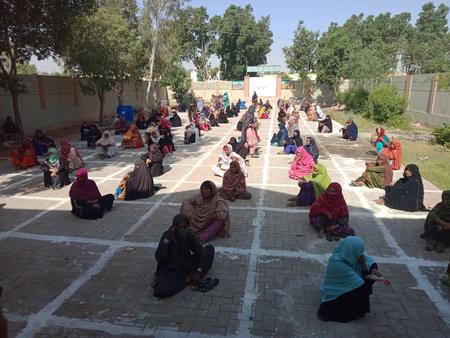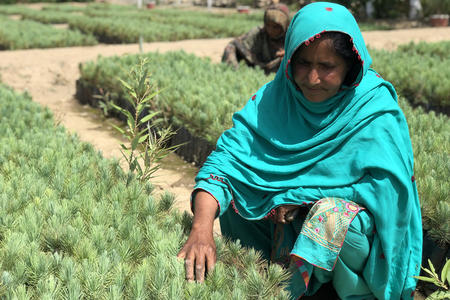Financing water supply, sanitation and hygiene for a clean, green and healthy Pakistan

To address challenges to water resources and the water, sanitation and hygiene (WASH) sector in Pakistan requires a step change in financing. Raheema Panhwar and John Garrett introduce our new report examining how the Government and the international community can fill the national WASH financing gap to reach everyone with sustainable services in the face of the COVID-19 and climate crises.
Pakistan faces major challenges ahead in tackling the COVID-19 pandemic and keeping progress on track to end poverty and achieve the Sustainable Development Goals (SDGs). In our new report with Development Initiatives – Equal to the Task – we evaluate the state of financing of Pakistan's WASH sector, highlighting the need for renewed effort and purpose from the Government and the international community to mobilise the resources necessary to tackle the pandemic and deliver universal access to safe WASH, within a ‘clean, green Pakistan’.
The COVID-19 pandemic began to gather momentum in Pakistan in March 2020, with reported cases increasing to more than 282,000 by the beginning of August and reported deaths to more than 6,000. The Government has responded on several fronts: with a lockdown of the economy on 23 March; emergency cash payments to poor households through the Ehsaas Emergency Cash Program; addressing personal and protective equipment (PPE) shortages in hospitals; establishing quarantine centres; and running education and communication campaigns to raise awareness of the essential preventative steps.
It has also rolled out a programme of handwashing stations at communal points, healthcare facilities and public places. Despite these efforts, the risks remain high for millions of people across the country, especially those who are vulnerable and living in poverty.
Increased WASH finance is essential for COVID-19 recovery and sustainable WASH security
In Equal to the Task, we emphasise the need to mobilise substantial increases in funds for WASH in support of the Government’s COVID-19 response and as part of accelerated action to achieve SDG 6 on water and sanitation.
This step change in approach is necessary not just as a response to the pandemic, which requires rigorous and regular handwashing with soap as a key preventative measure, but also to address the steep challenges facing the water sector more broadly. This includes availability of fresh water, which is threatened by a combination of high population growth, urbanisation, industrialisation and climate change. Rivers, lakes, wetlands and the Indus Delta are in rapid decline because of excessive withdrawals and widespread pollution, while severe groundwater depletion is evident, particularly in Lahore, Quetta and parts of southern Punjab.
The national financing gap for WASH is huge, and progress too slow
WHO/UNICEF data estimate that 126 million people in Pakistan live without access to safe water, 166 million without safely managed sanitation, and basic hygiene – a critical need during the COVID-19 pandemic as a first line of defence – is only available to 60% of households. Progress in delivering the essential services of safe WASH is not happening fast enough. And progress made – and, similarly, the challenges ahead – are very different across different provinces.
Our analysis identifies a major national financing gap for reaching everyone, everywhere in Pakistan. The total cost of achieving SDG 6 targets 6.1 and 6.2 in the country is estimated at US$12.3 billion a year, with $7 billion needed for capital investment (new and replacement infrastructure) and $5.3 billion in operations and maintenance. The annual total WASH budget, however, is just $1.1 billion (as of 2017), of which the Government provided $973.4 million.
Before the COVID-19 pandemic, the Government had ambitious plans to strengthen domestic resource mobilisation, as part of an extended funding facility programme agreed with the International Monetary Fund, which aimed to increase tax revenue from 15% of GDP to 20% by 2024. We urge the Government to sustain efforts over the coming decade, to build the fiscal space necessary for investment in basic services for all – a much more difficult challenge, but worthwhile.
Recommendations for immediate and sustained actions by Government and the international community
In our report, we recommend a five-fold increase in Government funding to the WASH sector – from federal and provincial governments – with a strong focus on equity and sustainability. Although this would not be enough to address the financing gap in full, it would represent a serious step towards a level of funding equal to the task of addressing the essential WASH components of the Government’s COVID-19 response; achieving progress on SDG 6; and contributing to the aims of the Clean, Green Pakistan Campaign.
The international community must support the Government in new ways, recognising that tackling COVID-19 and transitioning to a net-zero-carbon future are vital global public goods that justify substantial increases in global financial support. The beginnings of this are in place – support for Pakistan from the IMF in its Rapid Financing Instrument, debt relief from the G20, and a new World Bank programme for disaster resilience and ecosystem restoration. These must be supplemented with actual cancellation of debt, substantially increased aid and climate finance in grant form from Pakistan’s cooperating partners.
Our other key recommendations include the need for steps to address financial absorption constraints; strengthen coordination between federal, provincial and local institutions; and address skill gaps in areas such as financial management and operations and maintenance.
Some of our recommendations, including the response to COVID-19, need urgent implementation, while others – such as institutional reform, and improvements in dialogue between key actors and in data and monitoring – require sustained action over several years. Taken together, we believe these are the minimum steps required to address the challenges in the water resources and WASH sectors in Pakistan, including COVID-19, the rapid decline of water resources, the impacts of climate change and ensuring everyone in Pakistan has access to safe water, sanitation and hygiene.
- Read the report
- Read our global study into sustainable finance for reaching the SDGs and recovery from COVID-19
- Read our previous report Equal to the task: financing for a state of emergency in Nigeria's WASH sector and the accompanying blog introducing the research.
Raheema Panhwar is Provincial Coordinator for Sindh at WaterAid Pakistan. She tweets as @rahima_panhwer. John Garrett is Senior Policy Analyst for Development Finance at WaterAid. He tweets at @johngarre.





